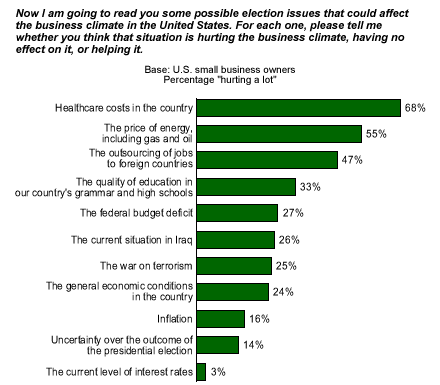Seventy-eight percent of small business owners say they have given quite a lot of thought to the presidential election, according to the latest Wells Fargo/║┌┴¤═° Small Business Index survey*. Fifty-eight percent are very or extremely enthusiastic about voting for president in this election and another 23% are somewhat enthusiastic. In fact, by 55% to 25%, small business owners say they are more, rather than less, enthusiastic about this year's election than previous elections.
One reason for this heightened enthusiasm may be that most small business owners expect this election to significantly affect the business climate. Seventy-eight percent believe that the election will have either a great or moderate impact on the business climate, while just 19% expect it to have only a little or no impact.
What kind of change to the current business climate would the nation's small business owners like to see as a result of the presidential election? ║┌┴¤═° asked small business owners to say whether they think some key election issues are hurting the business climate, having no impact, or helping. Although this survey was conducted in September, it provides some important insight into what the newly elected administration's priorities should be if it wants to improve the small business climate -- and thereby improve the country's economic climate as a whole.
Issues Hurting the Business Climate
Among the 11 election issues measured in the Wells Fargo/║┌┴¤═° Small Business Index survey, healthcare costs seem to plague small business owners the most.
- Two-thirds of owners (68%) say healthcare costs are hurting the business climate "a lot."
- Fifty-five percent say the price of energy is hurting the business climate a lot.
- The third-most damaging issue among small business owners is the outsourcing of jobs to foreign countries, cited by 47% as hurting a lot.
- Other items that small business owners say are hurting the business climate a lot include the quality of education in the grammar and high schools (33%), the federal budget deficit (27%), Iraq (26%), the war on terrorism (25%), and the general economic conditions in the country (24%).

Small Business Priorities
It's extremely difficult for politicians to fully address any significant public policy issue during a close and heated presidential race -- particularly when the issues are complex, the rhetoric is extreme, and there appears to be no real national consensus about how the issues should be resolved.
But political rhetoric aside, it's clear that the current economic recovery has failed to create the number and quality of jobs needed to form the foundation of another long-term economic expansion. So no matter who wins, the top business climate concerns of small business owners should have a special urgency for the next administration.
About 7 in 10 new jobs are created by small businesses. Why has hiring been so slow, compared with past economic recoveries? The top three issues that small business owners say are hurting the business climate a lot -- healthcare costs, energy costs, and job outsourcing -- represent a significant part of the answer. Global competition has made hiring U.S. workers relatively expensive compared with those in many other parts of the world, not only in terms of wages but also benefits. For many small businesses, providing healthcare for employees is a major hiring concern because of the high cost of health insurance. Energy costs and job outsourcing are also major hiring concerns for small businesses, as these issues threaten consumer spending and the potential future demand for their products and services.
If the new Republican or Democratic administration wants to enter the 2008 presidential election season with a better jobs record than that of the past four years, it will need to resolve these impediments to small business hiring, which directly affect the well-being of the U.S. economy. Meeting this challenge may be as difficult as -- or even more difficult than -- dealing with the issues that have dominated the current election: Iraq, terrorism, and taxes.
*Results for the total dataset are based on telephone interviews with 597 small business owners, conducted Sept. 1-29, 2004. For results based on the total sample of small business owners, one can say with 95% confidence that the margin of sampling error is ┬▒4 percentage points.
